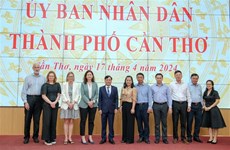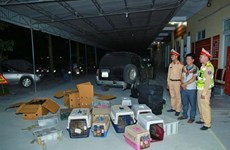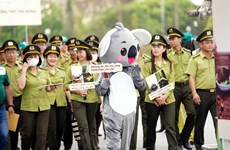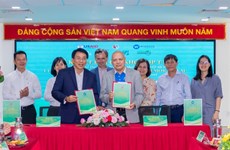Taskforce in national park rescues hundreds of trapped animals
In the Pu Mat National Park of the central province of Nghe An, there is a special task force that rescues wild animals trapped by hunters.
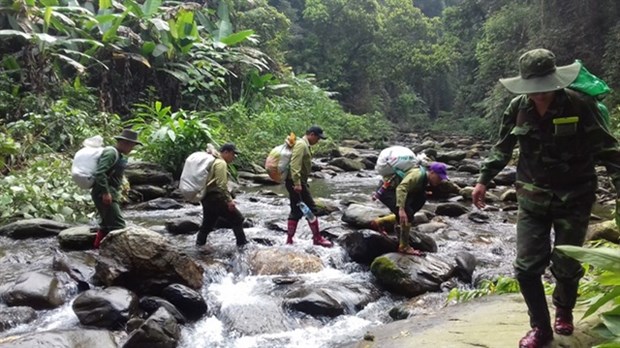 The animal rescue team of Pu Mat National Park passes a stream while patrolling the forest (Photo: thanhnien.vn)
The animal rescue team of Pu Mat National Park passes a stream while patrolling the forest (Photo: thanhnien.vn)Nghe An (VNS/VNA) - In the Pu Mat National Park of the central province of Nghe An, there is a special task
force that rescues wild animals trapped by hunters.
The animal rescue team of the park has 15 members carefully selected from 170 candidates.
The rescuers need to be in good health to go on forest trips for days at a time and they need to love the forest and wild animals.
The members of the team are forestry engineers and bachelor holders who experienced intensive training before starting their job.
Le Van Thanh has been on the team for two years. The first time he went into the forest on a mission, he was obsessed by drawstring traps and cages placed in bushes by animal hunters.
Pu Mat, in the language of the Thai minority group, means many steep hills. But craggy hills in the forest are not as dangerous as animal traps which cover hundreds of metres, he said.
After placing the traps, hunters put up tents and wait. Animals with high trading values will be sold while those with lower values will be butchered and cooked in the forest.
When the hunters leave, the traps are still in the forest, waiting for other animals to be ensnared.
When the animal rescue team finds a trap, often many animals have died in it.
“The trapped animals look miserable. Trapped monkeys, langurs whose bodies were covered with blood haunt our minds. Meanwhile monkeys and langurs in the group stand next to the injured bodies, helplessly looking at their kind painfully begging for help,” Thanh said.
When trapped in steel wire traps, not only monkeys and langurs but big animals like wild boars and bears also give up, he said.
Lightly-injured animals are given first aid by the rescue team and then released into nature. Those with more severe injuries are taken to the animal rescue centre for treatment.
The Pu Mat National Park is well known for its thousands of hectares of natural forest where 132 kinds of animals and hundreds of kinds of birds and reptiles live, making it a hotspot for hunting.
Over the past two years, Thanh and other team members along with forest rangers have patrolled some 95,000ha of forest in the park, facing hundreds of groups of hunters.
Most of the hunters have guns that they can turn on forest rangers if they are caught.
“We don’t have weapons so we have to find peaceful solutions from our own experience and skills to persuade hunters to surrender, seize their guns and ask them to remove the traps,” Thanh said.
The task force recently returned from a nine-day trip in the forest. But a mere two days later, they plan to go back in.
“Hunters follow our schedule and come back to the forest when we leave. Others who had their weapons and traps seized continue to come back. We have to have unexpected crackdowns,” Thanh said.
When they come back the next time, the hunters do not put up tents by the stream, which are easily recognised, but set up hammocks on high positions and wait.
They do not scatter traps over hundreds of metres but put single traps in different locations without leaving any trace.
“They place traps and at the same time use guns to hunt and shoot animals. That’s really a new challenge for the animal rescue task force,” Thanh said.
He said the trips into the forest have never been easy.
“We climb the mountain in the early morning and sleep on hammocks. Every corner in the park is our home. We cook whenever we see a water source.
“We even walked dozens of kilometres to seek water but could not find any. The team members had to use plastic bags to get water from the trunks of mossy trees. Forest insects, fallen tree branches and sudden flooding might attack us any time.”
In two years, the task force in collaboration with forest rangers has destroyed nearly 6,500 animal traps, 300 tents of hunters and rescued hundreds of trapped animals.
For the rescuers, the monthly salary of 8 million VND (350 USD) does little to compensate for all their hard work.
“But all of the team members feel they are part of the mission and are very passionate about the work,” Thanh said./.
The animal rescue team of the park has 15 members carefully selected from 170 candidates.
The rescuers need to be in good health to go on forest trips for days at a time and they need to love the forest and wild animals.
The members of the team are forestry engineers and bachelor holders who experienced intensive training before starting their job.
Le Van Thanh has been on the team for two years. The first time he went into the forest on a mission, he was obsessed by drawstring traps and cages placed in bushes by animal hunters.
Pu Mat, in the language of the Thai minority group, means many steep hills. But craggy hills in the forest are not as dangerous as animal traps which cover hundreds of metres, he said.
After placing the traps, hunters put up tents and wait. Animals with high trading values will be sold while those with lower values will be butchered and cooked in the forest.
When the hunters leave, the traps are still in the forest, waiting for other animals to be ensnared.
When the animal rescue team finds a trap, often many animals have died in it.
“The trapped animals look miserable. Trapped monkeys, langurs whose bodies were covered with blood haunt our minds. Meanwhile monkeys and langurs in the group stand next to the injured bodies, helplessly looking at their kind painfully begging for help,” Thanh said.
When trapped in steel wire traps, not only monkeys and langurs but big animals like wild boars and bears also give up, he said.
Lightly-injured animals are given first aid by the rescue team and then released into nature. Those with more severe injuries are taken to the animal rescue centre for treatment.
The Pu Mat National Park is well known for its thousands of hectares of natural forest where 132 kinds of animals and hundreds of kinds of birds and reptiles live, making it a hotspot for hunting.
Over the past two years, Thanh and other team members along with forest rangers have patrolled some 95,000ha of forest in the park, facing hundreds of groups of hunters.
Most of the hunters have guns that they can turn on forest rangers if they are caught.
“We don’t have weapons so we have to find peaceful solutions from our own experience and skills to persuade hunters to surrender, seize their guns and ask them to remove the traps,” Thanh said.
The task force recently returned from a nine-day trip in the forest. But a mere two days later, they plan to go back in.
“Hunters follow our schedule and come back to the forest when we leave. Others who had their weapons and traps seized continue to come back. We have to have unexpected crackdowns,” Thanh said.
When they come back the next time, the hunters do not put up tents by the stream, which are easily recognised, but set up hammocks on high positions and wait.
They do not scatter traps over hundreds of metres but put single traps in different locations without leaving any trace.
“They place traps and at the same time use guns to hunt and shoot animals. That’s really a new challenge for the animal rescue task force,” Thanh said.
He said the trips into the forest have never been easy.
“We climb the mountain in the early morning and sleep on hammocks. Every corner in the park is our home. We cook whenever we see a water source.
“We even walked dozens of kilometres to seek water but could not find any. The team members had to use plastic bags to get water from the trunks of mossy trees. Forest insects, fallen tree branches and sudden flooding might attack us any time.”
In two years, the task force in collaboration with forest rangers has destroyed nearly 6,500 animal traps, 300 tents of hunters and rescued hundreds of trapped animals.
For the rescuers, the monthly salary of 8 million VND (350 USD) does little to compensate for all their hard work.
“But all of the team members feel they are part of the mission and are very passionate about the work,” Thanh said./.









